#georgian national ballet
Text

Dancers of the Georgian National Ballet, 1988. Photographed by Julio Donoso.
2K notes
·
View notes
Text
youtube
Sukhishvili Georgian National Ballet - Kintrishi
(Someone sent me this I can't take credit but mmmmm that pulsating bass tho)
0 notes
Text
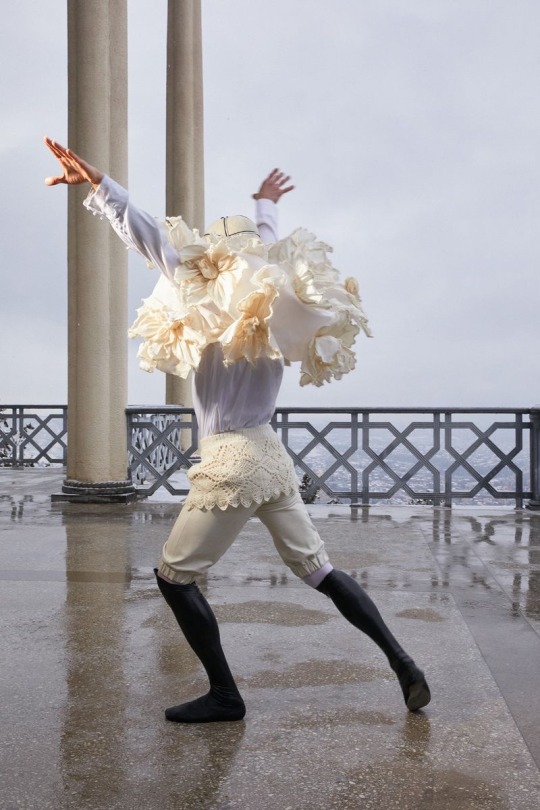

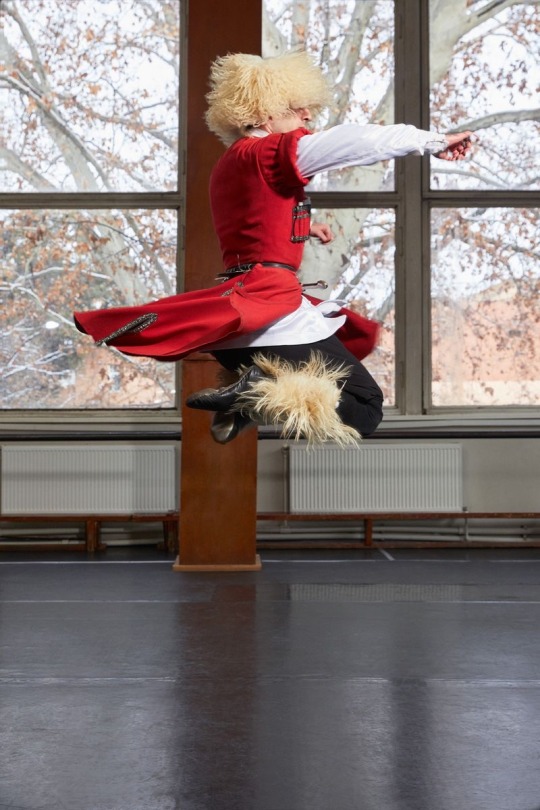


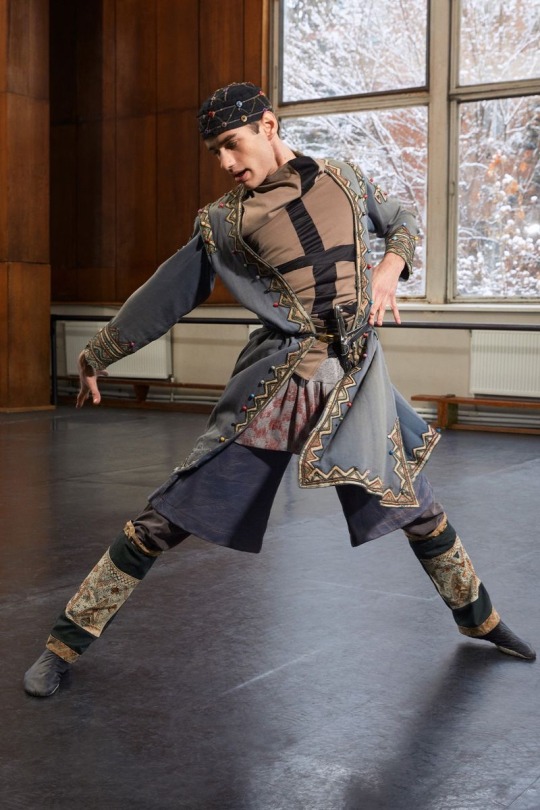
Sukhishvili Georgian National Ballet by Thomas Lohr for The Travel Almanac June 2023
536 notes
·
View notes
Text
Topgun AU Ideas
As I was scrolling through the Topgun tag on AO3 the other night, I realized that I was starting to see the same tropes and AUs over & over again. And while not a bad thing at all, personally, I'm just starting to get a little bored of reading the same story over & over.
So I started thinking about what kind of AUs I would love to see in the Topgun fandom and then I started making a list and it kind of spiraled out of control. Oops. 😆
I now present to you all my somewhat organized list of AU ideas! And feel free to use them for any fandom, I was just thinking about Topgun as I came up with them all. It's also by no means an exhaustive list so I probably missed some obvious ones.
Military AU ideas:
Pentagon/Joint Chiefs/White House Advisor (think The West Wing but for the military - this is the one I've been dying to see someone tackle!)
Navy JAG
NCIS
Blue Angels
Air Force Instead of Navy
Astronauts/NASA
Test Pilots
Naval Academy Instructors
Adversary/Aggressor Squadron
Office of Naval Intelligence
Sailors Instead of Pilots
Submariners Instead of Pilots
Naval Flight School Instructors (Aviation Preflight Indoctrination, Primary Flight Training, Intermediate Flight Training, and/ or Advanced Flight Training)
Character AU ideas:
Natasha is Maverick's daughter/niece
Bob is Maverick's son/nephew
Natasha is Ice's daughter/niece
Bob is Ice's son/nephew
Maverick is Amelia's father
Penny Is Also a Pilot
Penny’s Father Is An Air Force General
Obligatory Goose/Carole/Ice Lives AUs
Maverick’s Dad/Mom Lives
Any of the younger pilots is the kid of one of the other 86 boys
And a whole lot more under the cut!
American Historical AU ideas:
Colonial/Revolutionary War
Post-Revolutionary War
Lewis & Clark
War of 1812
Mexican-American War/The Alamo
Wild West (good guys or bad guys)
Organ Trail
The Gold Rush (California or Alaska)
Pony Express
Civil War/Reconstruction
Transcontinental Railway
Cattle Drives
Industrial Revolution/The Gilded Age
WWI
Bootleggers/Rum Runners/1920s
Jazz Age
Great Depression/Dust Bowl
WWII
Korean War
Vietnam War
1950s/Greasers
Moon Race/1960s NASA
1980s/The Cold War
Other Historical AU Ideas:
Ancient Greece/Rome
Middle Ages
Renaissance
Tudor
Elizabethan
Georgian
Regency
Napoleonic
Victorian
Edwardian
Fandom AUs:
The West Wing
Firefly
The Avengers
Agents of Shield
Star Wars
Star Trek
Harry Potter
Percy Jackson
Ocean's 11
Mission Impossible
Bourne
Tom Clancy/Jack Ryan
Jack Reacher
John Wick
Friends
New Girl
Supernatural
How I Met Your Mother
Chuck
Downton Abbey
CSI
Jurassic Park
Indiana Jones
The Office
Parks and Rec
Pacific Rim
Other Profession AU ideas:
Coffee Shop
Book Shop
Bakery/Candy Maker
Winery/Distillery
Restaurant/Chef
Bartender/Bar
Mechanic/Car Repair Shop
Doctor/Medical/Hospital
Firefighter/Police Officer/Detective
Wildfire Firefighter
Florist
Tattooist
Gardener/Gardening
Horse Racing
Motorsports (NASCAR/F1/Motocross, ect)
Professional Sports (baseball, football, hockey, soccer, basketball)
Rodeo/Bull Riding
Olympians
Air Racing (it’s a real thing!)
Actors (movie or stage)/Celebrity
Ballet Dancers
Teachers
College Professors
Lawyers/Judges
National Park Ranger
Cruise Ship
Pet Groomer/Veterinarian
Farmer/Rancher
Banker/Financial
Bodyguards
Zoo
Museum/Living Museum
Musician/Band
Mall (everyone works at different stores at the same mall)
Marketing
Archeologist
Spies
Reporters/Journalist
News Anchors
Lifeguards
Assassins
Criminals/Thieves/Heist
Bounty Hunter
Misc AU Ideas:
Royalty/Lost Royalty
Time Travel
Fae/Fairy
Mermaids/Selkies
Witch/Wizard
Werewolves/Vampires
Fantasy/Magic (including modern/urban settings)
High Fantasy
Dragons
Soulmates (color blindness, first words, timestamps, matching marks, can share emotions, Red String of Fate, can share dreams, can see/talk to each other in dreams, can write on each other's skin, telepathic, Soulmate Goose of Enforcement)
Omegaverse/ABO (not everyone’s cup of tea, just putting it out there!)
Roommates
Pirates
High School
College
Mob/Mafia
Fairytale
Arranged Marriage
Accidental Marriage
Fake Dating/Engagement/Marriage
Superhero/Villain
Apocalypse/Post-Apocalypse
Forbidden Love
Boarding School
Space/Sci-Fi
Road Trip
Summer Camp
Immortal/Reincarnation
Hallmark Movie
Amnesia
Pen Pals
Resurrection
Animal Shapeshifter
May this list inspire all of you amazing fanfic writers out there! 💜

#writing#writing ideas#writing prompts#prompts#fanfiction#fan fiction#fanfiction prompts#fan fiction prompts#AU ideas#fic ideas#fic prompts#topgun#top gun#topgun maverick#top gun fanfiction#top gun maverick#TGM#bradley rooster bradshaw#pete maverick mitchell#topgun fanfiction#TGM fanfiction#alternate universe#alternate universe ideas#AU prompts#AU Lists#prompt list#prompts list#I do filter out certain ships in the Topgun tag on AO3#so there is a possibility that fics already exist out there that falls under one of these AUs#feel free to leave fic recs in the comments!
38 notes
·
View notes
Text
At the National Opera of Ukraine in Kyiv recently, I watched a performance of an opera by the Ukrainian composer Mykola Lysenko. The work, charming and comic and an escape from the grimness of Russian missile attacks, is called Natalka Poltavka, based on a play by Ivan Kotliarevsky, who pioneered Ukrainian-language literature in the late-18th and early-19th centuries. Operas by Verdi, Puccini and Mozart, and ballets such as Giselle and La Sylphide, are on the playbill, despite the almost daily air raid sirens. But there is no Eugene Onegin in sight, nor a Queen of Spades, and not a whisper of those Tchaikovsky staples of ballet, Sleeping Beauty or Swan Lake. Russian literature and music, Russian culture of all kinds, is off the menu in wartime Ukraine. It is almost a shock to return to the UK and hear Russian music blithely played on Radio 3.
This absence, some would say erasure, can be hard to comprehend outside Ukraine. When a symphony orchestra in Cardiff removed the 1812 Overture from a programme this spring, there was bafflement verging on an outcry: excising Tchaikovsky was allowing Vladimir Putin and his chums the satisfaction of “owning” Russian culture – it was censorship, it was playing into Russia’s hands. Tchaikovsky himself was not only long dead, but had been an outsider and an internationalist – so the various arguments went. It took some careful explanation to convey that a piece of music glorifying Russian military achievements, and involving actual cannons, might be somewhere beyond poor taste when Russia was at that moment shelling Ukrainian cities – particularly when the families of orchestra members were directly affected.
In fact, such moments have been rare in western Europe. Chekhov and Lermontov continue to be read and Mussorgsky to be performed. Russian culture has not been “cancelled” as Putin claims, and Russian-born musicians and dancers with international careers continue to perform in the west – assuming they have offered a minimum of public deprecation of the killing and destruction being visited on Ukraine. Only the most naive would decry the removal of Valery Gergiev from international concert programmes. The conductor, who is seen as close to Putin, backed the Russian annexation of Crimea in 2014 (unrecognised by most UN countries), has declined to condemn the current full-scale invasion of Ukraine, and has a history of using his artistic profile in the service of the Russian state, such as conducting concerts in Russian-backed South Ossetia in 2008 in the wake of the Russo-Georgian war.
Inside Ukraine, though, things look very different. For many, the current war with Russia is being seen as a “war of decolonisation”, as Ukrainian poet Lyuba Yakimchuk has put it – a moment in which Ukraine has the chance to free itself, at last, from being an object of Russian imperialism. This decolonisation involves a “total rejection of Russian content and Russian culture”, as the writer Oleksandr Mykhed told the Lviv BookForum recently. These are not words that are comfortable to hear – not if, like me, you spent your late teens immersed in Tolstoy’s Anna Karenina and Chekhov stories; not if you have recently rekindled your love of Russian short fiction via George Saunders’ luminous book, A Swim in the Pond in the Rain; not if you adore Stravinsky and would certainly be taking a disc of The Rite of Spring to your desert island.
The context for this rejection has to be understood, though: Ukrainians are emerging from a history in which the Russian empire, and then the Soviet Union, actively and often violently suppressed Ukrainian art. This has worked in a number of different ways. It has included the absorption of numerous Ukrainian artists and writers into the Russian centre (such as Nikolai Gogol, or Mykola Hohol in Ukrainian), and the misclassifying of hundreds of artists as Russian when they could arguably be better described as Ukrainian (such as the painter Kazimir Malevich, who was Kyiv-born but Russian, according to the Tate). It has meant that writing in Ukrainian has at times been proscribed – Ukraine’s national poet, Taras Shevchenko, was banned from writing at all for a decade by Tsar Nicholas I. This silencing has encompassed the extermination of Ukrainian artists, like the killing, under Stalin, of hundreds of writers in 1937, known as “the executed renaissance”. Behind all of this stands horrific events such as the Holodomor, the starvation of about 4.5 million Ukrainians in 1932-33 in their forced effort to produce grain on Stalin’s orders.
This history places Ukraine in a very different position in relation to Russian culture than, say, Britain found itself in relation to German and Austrian art during the second world war, when Myra Hess programmed Mozart, Bach and Beethoven in her National Gallery concerts during the Blitz. “We have had cultural occupation, language occupation, art occupation and occupation with weapons. There’s not much difference between them,” the composer Igor Zavgorodniy tells me. In the Soviet period, Ukrainian culture was allowed to be harmlessly folksy – and Ukrainians, caricatured as drunken yokels dressed in Cossack trousers, were often the butt of belittling jokes. But Ukraine was not expected or allowed to carry a high culture of its own. At the same time, Russian artistic achievement was lauded as the very apex of human greatness. “We were raised in a certain piety towards the Russian literature,” explains the playwright Natalya Vorozhbit, who was educated in the Soviet period. “There wasn’t such piety towards any other literature.”
Putin himself has effectively doubled down on all this through his constant insistence, in his essays and often rambling speeches, that Ukraine has no separate existence from Russia – no identity, no culture at all, except as an adjunct of its neighbour. Indeed, his claim of Russia’s cultural inseparability from Ukraine is one of his key justifications for invasion. At the same time the Russian instrumentalisation of its artistic history is breathtakingly blatant. In occupied Kherson, billboards proclaiming it as a “city with Russian history”, show an image of Pushkin, who visited the city in 1820. Ukrainian artists also object to how, in a more general way, the projection of Russia as a great nation of artistic brilliance operates as a tool of soft power, a kind of ambient hum of positivity that, they would argue, softens the true brutality of today’s invasion. In Ukraine, there is a generalised cry of “bullshit” in relation to the myth of the “Russian soul”.
Some Ukrainians I speak to hope that one day, beyond the end of the war, there will be a way of consuming Russian literature and music – but first the work of decolonisation must be done, including the rereading and rethinking of classic authors, unravelling how they reflected and, at times, projected the values of the Russian empire. In the meantime, “My child will be perfectly all right growing up without Pushkin or Dostoevsky,” says Vorozhbit. “I don’t feel sorry.”
For many Ukrainians I encounter, the time for Russian literature will come again – when it can be critically understood as simply another branch of world culture, and as neither an unduly oppressive, nor overwhelming, force. At the National Opera House, I ask the choreographer Viktor Lytvynov when he thinks Tchaikovsky – a composer he loves – will be back on the programme. “When Russian stops being an aggressor,” he says. “When Russia stops being an evil empire.”
70 notes
·
View notes
Text

Nino Ramishvili (1910-2000), co-founder of the Georgian National Ballet and one of Georgia’s most famous dancers
7 notes
·
View notes
Text
How do you know I’m an Eastern European (or Central-Eastern European) fan of A Song of Ice and Fire, Game of Thrones series, Fire and Blood books, House of the Dragon and generally all of the Planetos universe by George R.R. Martin?
I have a headcanon that the Valyrians, including the Targaryens, have not only a culture inspired by the Byzantine culture, but also by the Caucasian cultures. By Caucasian, I mean actual cultures of the Caucasus mountains, not the wh*te s*premacy sh*t you get in the West.
This means that the houses from the Old Valyria, including the Targaryens, have their own distinct dances and music which are performed and played only at their balls and feasts, and those dances are inspired by Georgian, Chechen, Circassian, Dagestani etc. music and dances.
I mean, c’mon, wouldn’t they all look majestic while performing dances like Kartuli, Tsdo, Qarabsha, Samaia, Simdi and many other dances from the Caucasus? (Not to mention the infamous Legzinka?)
Grab some links of the Sukhishvili Georgian National Ballet:
youtube
youtube
youtube
youtube
youtube
I just wish that we could see Rhaenyra dancing Kartuli with Laenor on their wedding or Aemond performing Tsdo, okay?
Or Daemon dancing Kartuli seductively with Rhaenyra on her wedding day to Laenor
Just kidding I just want to dance Kartuli with Ewan Mitchell as Aemond
And preferably see him performing Tsdo

#a song of ice and fire#asoiaf#asoiaf lore#asoiaf headcanon#fire and blood#game of thrones#got#House of the dragon#hotd#hotd headcanon#valyrian culture#caucasian moutains#caucasian cultures#georgia#dagestan#chechnya#ichkeria#circassians#adygea#Georgian dances#Sukhishvili#george rr martin#Youtube#rhaenyra targaryen#Daemon targaryen#laenor velaryon#aemond targaryen#house targaryen#House Velaryon
25 notes
·
View notes
Text
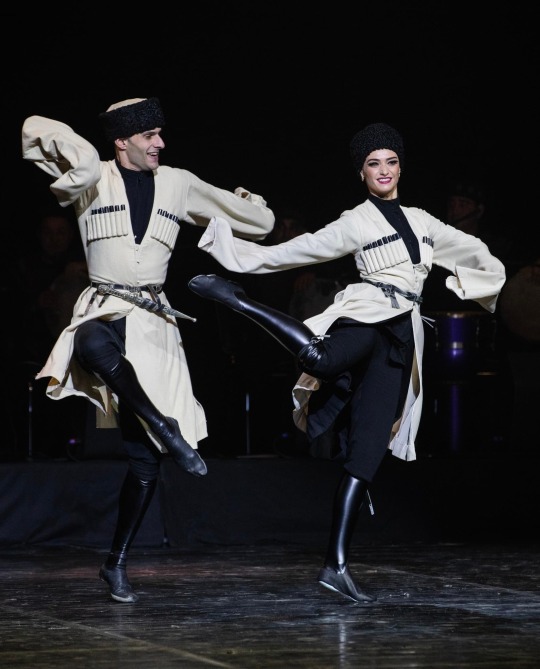
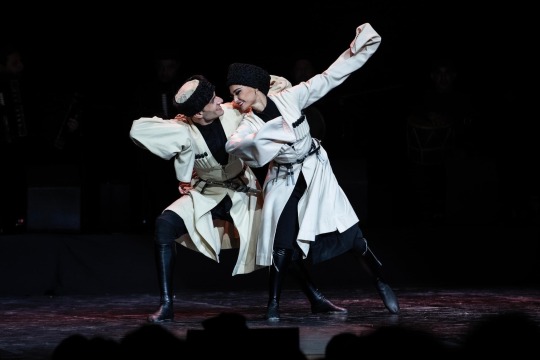

#ilouri#ილოური#georgia#saqartvelo#საქართველო#ცეკვა#სუხიშვილი#Spotify#sukhishvili#suxishvilebi#suxishvili
2 notes
·
View notes
Text
Exploring Tbilisi: A Guide to Georgia's Stunning Capital City

Tbilisi, the capital city of Georgia, is a hidden gem in the Caucasus region. Nestled between the Black Sea and the Caucasus Mountains, Tbilisi is a city that blends the old and the new, the traditional and the modern. From its ancient history and rich cultural heritage to its vibrant nightlife and trendy cafes, Tbilisi has something for everyone.
The Unique Architecture of Tbilisi
The first thing you'll notice when you arrive in Tbilisi is its unique architecture. The city is a mix of old and new, with towering Soviet-era buildings standing alongside charming cobblestone streets and colorful Georgian houses. One of the most iconic landmarks in Tbilisi is the Narikala Fortress, which offers stunning views over the city.
But Tbilisi's architecture goes beyond its landmarks. The city is filled with beautiful buildings and streets that are worth exploring. For example, the Old Town is a must-see for anyone interested in Tbilisi's history. Here, you'll find narrow streets, cobblestone alleys, and colorful buildings that transport you back in time.
Tbilisi's Rich Cultural Heritage
Tbilisi is more than just its architecture. The city is known for its rich cultural heritage, with a variety of museums, galleries, and theaters showcasing Georgian art and history. The Georgian National Museum, for example, is home to an impressive collection of Georgian artifacts, including ancient gold jewelry and medieval manuscripts.
But Tbilisi's cultural heritage goes beyond its museums and galleries. The city is also home to a number of historical and cultural landmarks, such as the Sioni Cathedral and the Metekhi Church, both of which date back to the 13th century. And for a more modern cultural experience, you can visit the Tbilisi Opera and Ballet Theater, which hosts regular performances of classical music and ballet.

The Delicious Cuisine of Tbilisi
Of course, no trip to Tbilisi would be complete without trying some of the local cuisine. Georgian food is hearty and delicious, with dishes like khinkali (meat dumplings), khachapuri (cheese-filled bread), and chakapuli (lamb stew) being just a few of the many local specialties. And of course, you can't leave Tbilisi without trying some of the local wine, which is some of the best in the world.
In Tbilisi, you'll find a wide range of restaurants and cafes that serve Georgian cuisine, as well as other international dishes. Whether you're looking for a fine dining experience or a more casual meal, you'll be able to find something that suits your tastes in Tbilisi.
Tbilisi's Vibrant Nightlife
Another thing that makes Tbilisi such a great destination is its vibrant nightlife. The city has a thriving music and arts scene, with clubs, bars, and cafes catering to all tastes. Whether you're looking for a traditional Georgian folk music performance or a more modern clubbing experience, Tbilisi has something for you.
In Tbilisi, you'll find a wide range of venues that cater to different music and arts scenes. For example, you can visit the Tbilisi Philharmonic Orchestra, which hosts regular classical music performances, or the Tbilisi State Theater, which stages a variety of plays and musicals. Or, if you're looking for something more contemporary, you can visit one of the many clubs and bars that dot the city. Tbilisi has a lively nightlife scene, with something to offer for everyone, from live music performances to DJs and dance parties.

Planning Your Trip to Tbilisi
Overall, Tbilisi is a city that has something for everyone. From its rich history and cultural heritage to its vibrant nightlife and delicious cuisine, Tbilisi is a must-visit destination for anyone traveling to Georgia. So why not plan your trip today and discover the hidden gem of the Caucasus for yourself?
When planning your trip to Tbilisi, there are a few things to keep in mind. First, the best time to visit Tbilisi is in the spring or fall, when the weather is mild and pleasant. The summer can be hot and humid, while the winter can be cold and wet.
Secondly, you'll need to plan where to stay in Tbilisi. The city has a range of accommodation options, from budget hostels to luxury hotels. Depending on your budget and preferences, you can choose a hotel or apartment that suits your needs.
Finally, it's a good idea to do some research and plan out your itinerary before you arrive in Tbilisi. This way, you can make the most of your time in the city and see all the sights and attractions that interest you.
In conclusion, Tbilisi is a vibrant and exciting city that has something for everyone. From its rich cultural heritage to its delicious cuisine and lively nightlife, Tbilisi is a must-visit destination for anyone traveling to Georgia. So why not plan your trip today and discover the hidden gem of the Caucasus for yourself?
#Tbilisi#Tbilisi Georgia#Travel in Tbilisi#Travel in Georgia#Georgia#Georgia Country#Tourism#Travellers
9 notes
·
View notes
Text
The only Silm adaptation I would ever accept would be one directed by Guillermo del Toro, and in which like half the cast is made up of members of the Georgian National Ballet.
Well, that or a Cartoon Saloon version of Beren and Luthien, or a straight-up opera of The Children of Hurin.
33 notes
·
View notes
Text
watching videos of georgian national ballet rehearsals, i am nothing etc
2 notes
·
View notes
Text
And Then We Danced (2020)
This film is one of the most gorgeous, sweet, heartbreaking films I've ever seen, and I'll be recommending it to everyone I see. Merab and Irakli's story, while it started out platonic, it was always queered. Going back to the first week, when we talked about queer subtext and the "silence" of queerness, that idea is very much present in this film. While identifying with the LGBTQ community isn't outlawed in the nation of Georgia, this film faced a lot of protest from the far-right when it was released, and this context is present in the relationships between the male characters. Irakli, when he first is introduced, is seen as threatening to Merab, as he is a naturally gifted dancer, who replaces Merab in his duet, which he has been training with his partner on for months. While Irakli is a jovial person with the boys, he understandably makes Merab jealous. The subtext in their early interactions in the dance studio-- the conscientious touches, word choice, and proximity in which they sit are very queer. Irakli gives advice to Merab on how to improve his form, which you often see in RomComs between the male and female love interests. As their relationship evolves from enemies (seemingly), to friends, to more, they never explicitly say "oh I'm gay" (or something to that extent), it just sort of happens, not by accident of course. The yearning and self discovery in Merab is what makes this film so sweet to me.
At the end, Irakli reveals to Merab that he is getting engaged, which absolutely shatters Merab, and you see it both in his facial expressions and body language, but also in the mise-en-scene, as his collared shirt, pale complexion, and also the white clothing of the people surrounding him, make Merab look completely washed out, intensifying the effect of this very visceral heartbreak. In his whirlwind of emotions, he injures himself dancing, which plays an important part in his audition for the main ensemble of the Georgian National Ballet. He enters wearing Irakli's robes, which he wore when he danced at weddings, presenting this mask of traditional masculinity. As he performs his piece, he definitely has improved in a way that would satisfy his teacher, but there are certain aspects of his performance that fail to meet expectations, such as "having soft hands," a concept that is inherently queer, and dips into playing with masculine and feminine roles in dance. I felt like he was incredibly masculine throughout this performance, as he had the costume, he exhibited strength and resilience (at a point his ankle had started bleeding), his body language was quite stoic-- all of which I identify with masculinity. At the same time, he exhibited femininity in his performance as well through his facial expressions, the grace and delicacy of his movements, as well as the balance between how he was expected to perform and how he wanted to express himself. The balance between all of these aspects are what made his final performance so breathtaking and engaging.
All around, I thoroughly enjoyed this film and I think everyone should watch it.
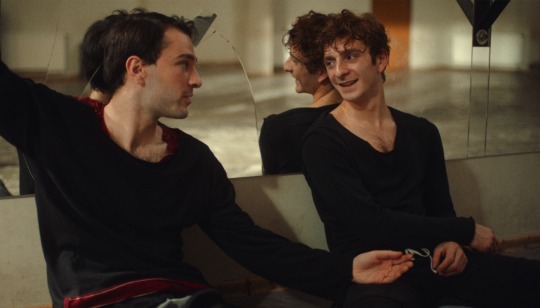
3 notes
·
View notes
Text
georgian national ballet is in belgrade again and the tickets are cheaper than last time. might ask for that as a birthday gift from my parents
#the tickets are around 7000 and last time they were 10000. that's half my monthly budget :)#ura.txt
0 notes
Text
Sukhishvili - Georgian National Ballet - Genève, Switzerland | 14 Nov, 2023.
Find out more / Get Tickets.
0 notes
Text
Sukhishvili - Georgian National Ballet - Genève, Switzerland | 14 Nov, 2023.
Find out more / Tickets are here.
0 notes